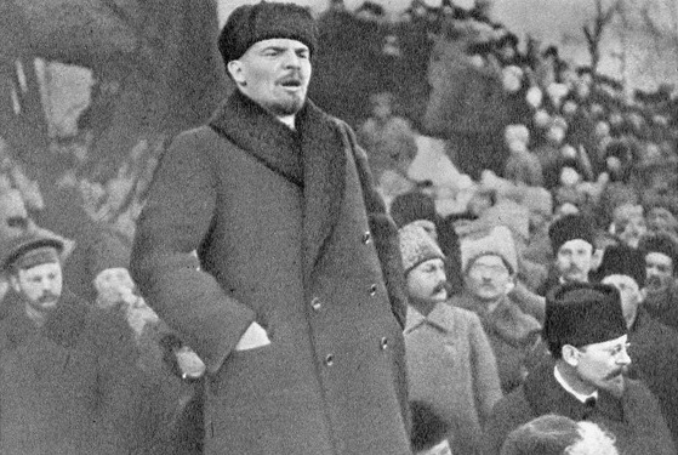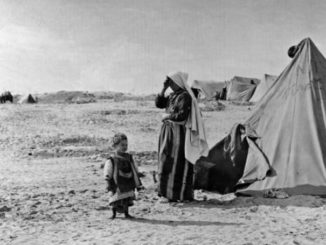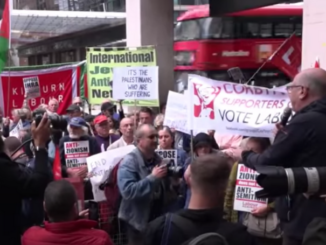
We can understand some fundamental features of the Zionist settler-colonial project through Lenin’s teachings, specifically that Israel was founded and continues to exist on the basis of violating Palestinian self-determination.
Vladimir Ilyich Lenin (1870-1924) was an outstanding Marxist, revolutionary, and theorist. In addition to his immense historical role in the Russian Revolution, Lenin was one of the greatest thinkers of the 20th century.
His profound theories are invaluable to understanding the world today; in particular, Lenin’s writings on the right of nations to self-determination provide an indispensable tool for analyzing the question of Palestine from a Marxist perspective.
A Theoretical Outline
Lenin was a fierce advocate for the self-determination of all oppressed nations. His teachings on the topic, often in the form of theses and polemics, are where we can find brilliant analysis which can be abstracted and reapplied to contemporary Palestine. As in the totality of his thought, Lenin was immensely influenced by the writings of Marx and Engels on the national questions of their day.
He developed their positions to suit better the age of imperialism, i.e., the highest stage of capitalism, that the world had entered in the 1890s, after the death of Marx and Engels. By the mid-1910s, Lenin staunchly argued for “an anti-imperialist alliance between the working class in the advanced countries and national liberation movements in the colonies” and made sure to emphasize the “division of nations into oppressing and oppressed ones [as] a fundamental, most important and inevitable fact.”
He did not make moral arguments while supporting the right of liberation for oppressed nations (not to say he did not care for the long-suffering oppressed nations, which he most certainly did), instead, he outlined his positions in a scientific, principled, and pragmatic manner which stressed the importance of linking democratic revolutionary movements in oppressed nations to socialist ones in the oppressor countries:
“We must combine the revolutionary struggle against capitalism with a revolutionary programme and tactics on all democratic demands: a republic, a militia, the popular election of officials, equal rights for women, the self-determination of nations, etc.”
It is important to note that while Lenin recognized self-determination as a part of the “many-sided, consistent and revolutionary struggle for democracy” he still correctly asserted that the “domination of finance capital, as of capital in general, cannot be abolished by any kind of reforms in the realm of political democracy, and self-determination belongs wholly and exclusively to this realm.”
et, Lenin crucially emphasized that “The domination of finance capital…does not in the least destroy the significance of political democracy as the freer, wider and more distinct form of class oppression and class struggle.” Complete liberation can only come through in the victory of socialism, yet national liberation is a progressive development towards that aim.
Zionist Colonization and Palestinian National Liberation
It is a great shame that Lenin was not alive to see the development of anti-colonial theory (which was greatly influenced by his work) and concepts like settler-colonialism that are now essential to understanding the nature of Zionism and Israel. Despite this, crucial elements of Lenin’s thought on self-determination still apply to a contemporary analysis of Palestine.
We can understand some fundamental features of the Zionist settler-colonial project through Lenin’s teachings, specifically that Israel was founded and continues to exist on the basis of violating Palestinian self-determination. After decades of steady colonization and military buildup, Zionist settlers annexed 78% of historical Palestine in 1948, later in 1967, capturing the whole region and the Syrian Golan Heights.
To Lenin, socialists are to be against annexations above all else “because annexation violates the self-determination of nations, or, in other words, is a form of national oppression.” As Lenin elaborated, annexation “is the establishment of state frontiers contrary to the will of the population.”
In the case of Israel, its foundation came through the ethnic cleansing of Palestine and the establishment of a new settler state against the will of the native Palestinian population. Israel exists entirely on the grounds of denying a nation, the Palestinian Arab people, their right to self-determination. This fact is crucial to understanding why Israel and Zionism must be swept into the dustbin of history.
Lenin’s work also provides many lessons for socialists outside of Palestine, particularly those residing in imperialist countries.
To be in solidarity with the oppressed:
“Socialists must not only demand the unconditional and immediate liberation of the colonies without compensation—and this demand in its political expression signifies nothing more nor less than the recognition of the right to self-determination—but must render determined support to the more revolutionary elements in the bourgeois-democratic movements for national liberation in these countries and assist their rebellion—and if need be, their revolutionary war—against the imperialist powers that oppress them.”
Applying this to Palestine, socialists around the globe must demand the unconditional liberation of Palestine from Zionist colonial oppression while simultaneously supporting the revolutionary national liberation movements in Palestine, not reformist organizations which seek to collaborate with Israel. This would also entail particular support for socialist organizations like the Popular Front for the Liberation of Palestine, in addition to agitation supporting the broader Palestinian resistance.
Lenin also importantly proclaimed that “The Socialist of a ruling or colony-owning nation who fails to champion [the right of nations to self-determination] is a chauvinist.” It also has to be added that the right of return for all families forced out of their homeland must be part of Palestinian national liberation. If not, the whole of the Palestinian Arab nation would still not be guaranteed their right to self-determination.
Lenin additionally differentiated between an imperialist war, “when both belligerents not only oppress “foreign peoples” but are fighting a war to decide who shall have a greater share in oppressing foreign peoples” and national liberation movements of the oppressed and colonized.
He emphatically supported the “just,” “defensive wars” of the oppressed fighting for liberation, in our case, the Palestinian resistance. Simultaneously he correctly renounced “‘defense of the fatherland’ in an imperialist war” like that of the present war in Ukraine, which is ultimately a conflict between two imperialist blocs (Russia and NATO). On the other hand, the struggle of Palestinians against Israel (and its imperialist patrons) is anti-imperialist.
Ultimately to Lenin, the struggle for self-determination is part of the progressive battle for political democracy. In discussing the need for such national revolutionary movements, he stated: “that it is necessary to formulate and put forward all [the democratic] demands, not in a reformist, but in a revolutionary way; not by keeping within the framework of bourgeois legality, but by breaking through it; not by confining oneself to parliamentary speeches and verbal protests, but by drawing the masses into real action, by widening and fomenting the struggle for every kind of fundamental, democratic demand, right up to and including the direct onslaught of the proletariat against the bourgeoisie, i.e., to the socialist revolution.”
This remains just as relevant today, specifically concerning the question of Palestine, as it was when Lenin wrote it in 1916.

– Mike Veronda Hazou is a Palestinian American historian and writer. He contributed this article to The Palestine Chronicle.







